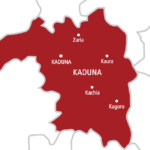More than five years after the launch of a highly anticipated power project aimed at stabilising electricity in Kaduna’s rapidly growing Millennium City, the initiative remains incomplete, leaving the community to grapple with unreliable power supply.
Six years ago, residents of Millennium City, a housing project of the Kaduna State Government in Chikun Local Government Area had reason to hope. A highly anticipated power project was launched in 2018 with a promise to supply the growing community with stable electricity. Today, that seems far reaching as the project lies abandoned, leaving the community at the mercy of power rationing which continues to cripple small businesses, and disrupt the daily lives of residents.
Once celebrated as a cornerstone of the Kaduna State Government’s infrastructure master plan, the Millennium City, boast of houses, shopping malls and other business facilities that spring up daily. However, the community continues to grapple with epileptic power supply, a situation, the 2018 power project, designed to construct a 16.5KM 33KV overhead line from the Old Power Station in Kakuri to Millennium City, was expected to address.
At the heart of the project was a 15MVA substation project awarded to Energy Lite Nigeria Ltd and valued at N670,948,949.48. But the project, which was meant to be completed within 12 months, never progressed beyond 20 per cent. No significant work has been done on-site since then.
After receiving a mobilisation fee of N134,189,000.90 (20%) of the project budget on the 13th November 2018, with no approved consultant, the contractor, Energy Lite Nigeria Ltd halted work at 20 per cent, while the Kaduna State Power Supply Company (KAPSCO) went silent. With no communication from the Kaduna State Public Procurement Authority (KADPPA) for evaluation of the work done and proceeding, residents are now left to wonder: What went wrong?
Timeline of delays
By 2018, Millennium City had undergone a dramatic transformation, evolving from an underdeveloped area of mud houses into a sought-after district with key infrastructure projects such as the Makarfi City Layout Link Bridge. In 2008, there was a revised master plan introduced by then Governor Namadi Sambo.
Today, Millennium City is a hub of investment and rapid urban expansion, home to private housing estates like Urban Shelter, Nurus-Siraj, Kagara Place, Mamadi, and Ummi, alongside federal and state government estates. Shopping complexes like Jagaban Mall, Muhammadu Buhari Mall, HM&S Plaza, and other emerging business hubs now line its streets, reflecting the area’s swift growth.
Governor Nasir El-Rufai’s 2018 Kaduna Infrastructure Master Plan (KADIMP) outlined an ambitious solution: a power upgrade to support the area’s development. Yet, despite an initial disbursement of N134,189,000.90 from the initial N670,948,949.48 budgeted amount in 2018 no additional releases were made. Subsequent years saw budgetary provisions of N538,123,016.07 in 2020, N343,100,000.00 in 2021, N573,843,000.00 in 2022 and N430,350,000.00 in 2023 but no releases were made, which grounded further work on the 15MVA substation. By 2024, no additional funds were earmarked for the project, leaving the community and officials in limbo.
Unanswered questions
While the delays have been attributed to a range of factors such as environmental concerns, administrative stagnation, and even the COVID-19 pandemic, interviews with insiders from Kaduna State Power Supply Company (KAPSCO) reveal deeper issues of mismanagement.
The sources, who expressed fears of being victimised if they spoke on record, said one of the main problems was the former MD of KAPSCO, Dolapo Popoola’s disinterest in advancing the project. They claimed since 2019, no official project evaluation has been conducted to justify further payments, leading to long-standing inaction from the agency.
Dolapo Popoola, the former Managing Director, who was in office during the project’s development, was contacted for comment on these issues. However, she declined, stating that she requires approval from the state government to speak on the matter as she is no longer the MD.
An anonymous source explained and shared minutes from a March 2021 meeting held by the Kaduna State Public Procurement Authority (KADPPA), Kaduna State Power Supply Company (KAPSCO), and a proposed consultant, ATM & Partners. The document revealed that KAPSCO’s inaction has been a major factor in delaying the Millennium City power project.
The situation, Weekend Trust gathered, began when the Kaduna Power Supply Company identified the need to hire a consultant in June 2020. This request was later reviewed by Kaduna State Public Procurement Authority KADPPA, who, in March 2021, indicated their agreement with the plan but required KAPSCO to obtain formal approval before proceeding. This approval, according to KADPPA would ensure compliance with procurement guidelines and transparency.
However, details of the minutes showed that no updates had been provided by KAPSCO on the project since 2019. KADPPA additionally requested a revalidation of the project details. At the March 25, 2021 meeting between the government agencies, including the proposed consultant, KADPPA then provided clear instructions on how KAPSCO could move forward, including formal steps to revive the project.
Despite this guidance, KAPSCO did not act on instructions, leaving the project stalled.
The current Managing Director of Kaduna Power Supply Company (KAPSCO), Idris Aminu Idris, shared his perspective on the ongoing challenges surrounding the 15MVA substation project at the Millennium City with our reporter.
“When I took office in April 2024, I inherited little to no record of the project,” he said, adding that after visiting the site, he began to explore all avenues to uncover more details about the status of this project. “We are aware of the rumours regarding the land status and are fully committed to investigating the situation and we are actively working to resolve this issue. We are a government of continuity based on priority,” KAPSCO’s MD said.
Mukhtar Haruna, the head of Millennium City, which includes Danbushiya, Kadaure, Sabon Gida, Keke A and B, and surrounding communities, said he was not aware of any power project in the area, as no one had informed him about it. He also acknowledged the Kaduna Electric’s management’s efforts in implementing a shifting strategy for electricity distribution but emphasised the need for improvements due to the rapid population growth in the area.
Environmental risks and the abandoned site
Another claim from insiders of the company suggests that the substation’s proximity to a riverbank posed environmental hazards that may have contributed to the delay. A local rice farmer, Ibrahim Yusuf who owns a farm next to the building, noted that the area floods annually, raising concerns about the site’s sustainability.
Mr Idris, KAPSCO’s MD, however, believes the location is not an issue. “Regarding the placement of the substation near a river, this is a matter of science. Each managing director has his own expertise and vision,” he said and explained that “What the former MD, Dr Abdulkarim Mayere saw in the project may differ from the immediate past MD’s (Dolapo Popoola) perspective, which could have led to the project’s halt. Personally, I believe a substation can be located anywhere as long as the necessary safety precautions are in place.”
A visit to the substation site reveals that while the building has been completed, plastered, roofed, and fitted with windows and doors, no equipment has been installed. Poles have been erected and partially wired but work on the station remains incomplete.
Engineer Muhammad Abbas, an expert in power distribution at the Jos Electricity Distribution PLC, Bauchi office, emphasised the risks of placing a substation near a river. He said while a river can provide cooling benefits, the proximity also increases the likelihood of flooding, oil leakage, and equipment failure—all significant risks that demand proper environmental assessments. “Without the right precautions, placing a substation in a flood-prone area can lead to costly damage and pose safety risks to the community,” Mr Abbas explained.
The power crisis in Millennium City
With a fast-growing population, Millennium City’s power supply has deteriorated, affecting both residents and businesses. Small businesses, like grinding machine operators and welders in nearby Danbushiya, and neighborhoods like Keke A and B, are particularly hard-hit, Weekend Trust gathered.
Many report waiting days for power to complete simple tasks, while others are forced to rely on costly generators, cutting into their profits.
“We have to wait for days just to grind grains for customers,” said Idris Sani, a grinding machine operator. “Sometimes, we use the night power shift, but it disturbs the neighbours,” he explained.
“Using generators make us lose money,” lamented a welder, Ishaq Zubairu, who has over 27 years of experience. “But this is my livelihood, and I can’t afford to stop,” he said. Another businessman, Nuhu Muhammad, who manages a team of 30 welders, echoed similar frustrations, explaining that even when the power shift is allocated, it is rarely consistent.
Despite recent efforts by the Kaduna Electric to upgrade the existing infrastructure including a new 7.5MVA transformer and 11KV line, residents and business owners say the community remains underpowered.
Lawal Mahmud, chairman of the Danbushiya Community Electricity Committee, said the community took matters into their hands in 2017/18, raising over N5 million through contributions from residents and a land donation to fund electricity expansion.
“When I moved here in 2013, there was no electricity. We tasked ourselves with raising funds and brought a contractor to extend the power supply from the entry bridge substation,” he said. He added that in 2020, a federal government intervention further improved electricity access with the installation of a substation. However, Mahmud noted that the state government’s involvement in any power project in the area remains unclear to the community.
He emphasised the need for additional substations and transformers to stabilise electricity supply, stating, “Our hospitals and businesses are suffering due to unreliable power. We urge the current government to review the project and ensure Millennium City is provided with stable electricity for meaningful growth.”
This report is sponsored by UDEME under Centre for Journalism Innovation and Development.

 Join Daily Trust WhatsApp Community For Quick Access To News and Happenings Around You.
Join Daily Trust WhatsApp Community For Quick Access To News and Happenings Around You.


